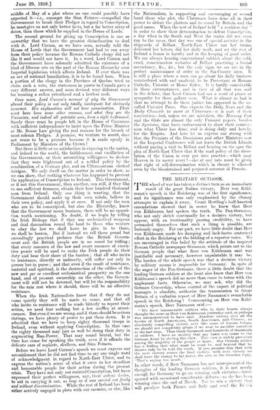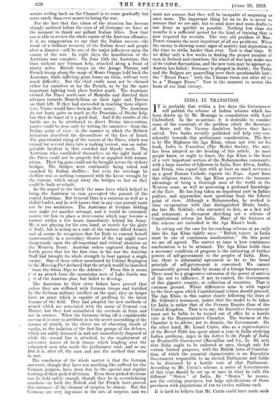THE MILITARY OUTLOOK.
r THE wheel of war has taken a distinct turn as an immediate result of the great Italian victory. Herr von Kuhl- mann's speech in the Reichstag was of the first significance, and its significance was only emphasized by the clumsy attempts to explain it away. Count Hertling's half-hearted emendations showed that in secret he knew that Herr von Kuhlmann had spoken the truth. The Pan-Germans, who not only shriek continually for a decisive victory, but appear, with an irrationality passing credibility, to have persuaded themselves that such a thing is possible, are furiously angry. For our part, we have little doubt that Herr von Kithlmann made his damping and lack-lustre oratorical effort in the Reichstag at the bidding of a superior voice. We are encouraged in this belief by the attitude of the inspired Roman Catholic newspaper Germania, which points out to the German people that what Herr von Kuhlmann said was justifiable and necessary, however unpalatable it may be. The burden of the whole speech was that a decisive victory by military means is impossible for Germany. In spite of the anger of the Pan-Germans, there -is little doubt that the leading German soldiers at the front also know that Herr von Kiihlmann's speech did no more than come to terms with the unpleasant facts. Otherwise, we may ask, why did. the German Censorship, whose control of the export of political messages is absolute, authorize the transmission to Great Britain of a verbatim report of Herr Naumann's remarkable speech in the Reichstag ? Commenting on Herr von Kiihl- mann's speech, Herr Naumann said :— " We have innumerable soldiers who in their hearts always thought the same as Herr von Ktihimann yesterday said, or perhaps was misunderstood to have said. Absolute victory over all the hordes of North Americans, South Americans, and Chinese, an absolutely compelling victory over this mass of hmnrm beings, we should not completely attain if we were to sacrifice ourselves to the last man. Thus think thousands and hundreds of thousands of soldiers. I have no anxiety that any harm can ensue to the German Army by stating this view. This view is widely prevalent among the majority of the people at home. Our German soldier has a feeling that what must be must be, and beyond that he desires only to be told the truth. If you promise him that with the next victory comes the final victory, with next victory we shall force the enemy to his knees, the men in the trenches reply, ' That's saying too much.' " In other words, if Herr Naumann has not misrepresented the thoughts of the leading German soldiers, it is not nearly enough for Germany to go on winning such victories—inter- spersed with occasional considerable defeats—as she has been winning since the end of March. Not to win a victory that will paralyse both France and Italy and send the 13r.: armies reeling back on the Channel is to come gradually but more surely than ever nearer to losing the war.
For the fact that this vision of the situation has become sharply outlined before the eyes of all Germany we have at the moment to thank our gallant Italian Allies. Now that one is able to review the whole course of the Austrian offensive, it is no exaggeration to say that the Italian success—the result of a brilliant recovery of the Italian Army and people after a disaster—will be one of the major influences upon the course of the war. In eight days the humiliation of the Austrians was complete. On June 15th the Austrians, this time without any German help, attacked along a front of ninety miles. British troops on the Asiago Plateau and French troops along the range of Monte Grappa held back the Austrians, while inflicting great losses on them, without very much difficulty. But the chief credit must not be claimed either for ourselves or for the French, as by far the more important fighting took place further south. The Austrians crossed the Piave north-east of Montello and directed their advance towards Montebelluna on their right and Treviso on their left. If they had succeeded in reaching these object- ives, Venice would have been at their mercy. The Austrians do not boast quite so much as the Prussians of Divine help, but they do boast of it a good deal. And if the results of the battle are to be attributed to direct Divine intervention, justice could be done only by writing the narrative—from the Italian point of view—in the manner in which the Hebrew historians described the discomfiture of the foes of Israel. The providential rising of the waters of the Piave, which was turned for several days into a rushing torrent, was an unfor- gettable incident in that crowded and bloody week. The Austrians who established themselves on the right bank of the Piave could not be properly fed or supplied with ammu- nition. Their big guns could not be brought across the rickety bridges. The bridges were continually being raked and smashed by Italian shellfire ; but even the wreckage by shellfire was as nothing compared with the havoc wrought by the torrent, which swept away the bridges as fast as they could be built or rebuilt.
In the sequel to the battle the same force which helped to bring the Austrians to ruin prevented the pursuit of the routed Austrians But General Diaz is a cautious as well as a skilful leader, and he well knows that in any case pursuit must not be too ambitious. The AuStrians at German bidding may make vet another attempt, and it would be extremely unwise for him to place a river-course which may become a torrent within a few hours immediately behind his Army. He is not playing for his own hand, or merely for the glory ot Italy, but is acting as a unit of the various Allied Armies, and of course he recognizes that for Italy to commit herself unnecessarily in a secondary theatre of the war might react dangerously upon the all-important and critical situation on the c'Western Front. Austrian orders captured during the battle prove that for the first time in the war the Austrian Staff had brought its whole strength to bear against a single enemy. One of these orders mentioned by Colonel Repington in the Morning Port declared that the attack would be launched from the Swiss Alps to the Adriatic." From this it seems t', at an attack from the mountains west of Lake Garda was rt of the Austrian plan, but failed to develop.
The Austrians by their utter failure have proved that unless they are stiffened with German troops and fortified by the German military intellect on the spot, they no longer have an army which is capable of profiting by the latest lessons. of the field. They had adopted the new methods of attack which are associated with the name of General von Maier, but they had assimilated the methods in form and not in essence. When. the Germans bring off a considerable success it is easy to attribute it to the secret assembling of the masses of attack, to the clever use of obscuring clouds of smoke, to the isolation of the first-line groups of the defence, which are safely hemmed in and not immediately disposed of while the second line is attacked, to the employment of successive waves of fresh troops which leapfrog over the exhausted men who made the preliminary rush, and so on. But it is, after all, the man and not the method that wins in war.
The conclusion of the whole matter is that the German successes, though they have not anything like sufficed for the German purpose, have been due to the special and regular training of their picked divisions. Even these picked divisions can be held safely enough, though they be in overwhelming numbers—as both the British and the French have proved this summer—if the element of surprise be absent. But the Germans are very ingenious in the arts of surprise, and we must not assume that they will be incapable of surprising us once more. The important thing for us to do is never to assume that we are safe, but to send more and more drafts to our Army as quickly as possible. Nothing less than six months is a sufficient period for the kind of training that is now required for recruits. The very old problem of Man- Power remains the most important of all our problems. When the enemy is showing many signs of anxiety and depression is the time to strike harder than ever. Now is that time. If we delay only a few weeks in finding the proper number of men in Ireland and elsewhere, the wheel of war may make one of its violent fluctuations, and the new turn may be against us. Austria has failed ; Germany is plunged in doubt ; the Turks and the Bulgars are quarrelling over their questionable loot ; the " Bread Peace " with the Ukraine turns out after all to be a " Hunger Peace." Now is the moment to secure the basis of our final victory.



























 Previous page
Previous page